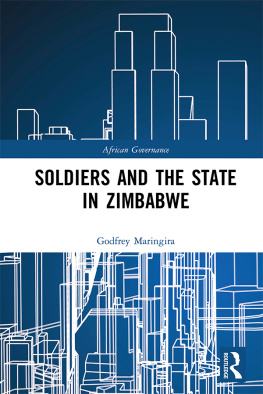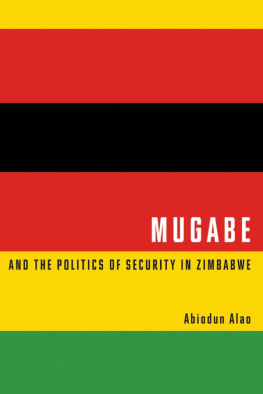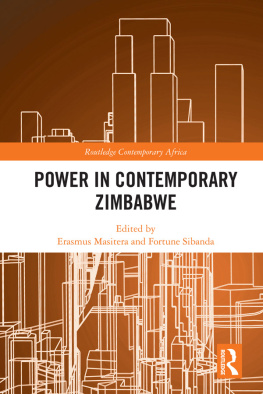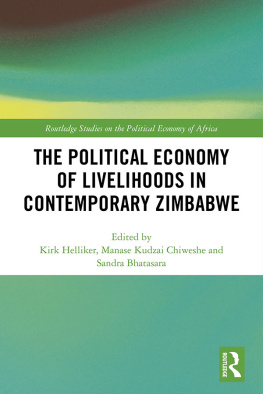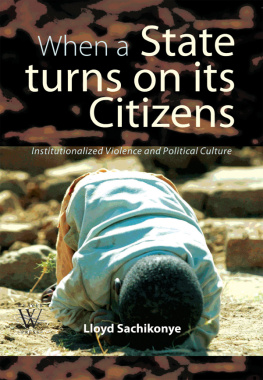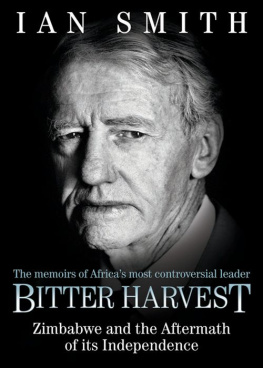Soldiers and the State in Zimbabwe
This book explores the barracks experiences of soldiers in post-independence Zimbabwe, examining the concept of military professionalism within a state in political crisis.
Drawing upon interviews with former soldiers of the Zimbabwe National Army, Soldiers and the State in Zimbabwe casts a light on the oppression of soldiers by commanders who sought to repress and control the political thinking of their men. By contextualising the political, economic, and material conditions in which Zimbabwean soldiers existed, Godfrey Maringira reveals the everyday victimisation and violence of the barracks. Exploring such events as the imposition of the Defence Act, the desertion of soldiers, and the 2017 military coup in Zimbabwe, the book presents and discusses the politicised nature of the military in post-independence Zimbabwe, and the political consequences of service in a state in deep political crisis.
Soldiers and the State in Zimbabwe will be of interest to scholars and students of African politics, military and security studies, and African studies.
Godfrey Maringira is a professor of anthropology based at Sol Plaatje University, Kimberly, South Africa, and a recipient of the Volkswagen Foundation Senior Research Fellowship. He was awarded the 2018 Best African Author Prize for his article Politicization and resistance in the Zimbabwean National Army in African Affairs. He is also a Research Associate at the University of Johannesburg, South Africa.
African Governance
1. Traditional Institutions in Contemporary African Governance
Edited by Kidane Mengisteab and Gerard Hagg
2. Non-State Social Protection Actors and Services in Africa
Governance Below the State
Edited by Nicholas Awortwi and Gregor Walter-Drop
3. State-building Interventions in Post-Conflict Liberia
Building a State without Citizens
By Susanne Mulbah
4. Mauritanias Colonels
Political Leadership, Civil-Military Relations and Democratization
By Boubacar NDiaye
5. The Rwenzururu Movement in Uganda
Struggling for Recognition
By Martin Doornbos
6. South Sudan
Post-Independence Dilemmas
Edited by Amir Idris
7. Institutional Legacies, Decision Frames and Political Violence in Rwanda and Burundi
By Stacey M. Mitchell
8. Aid Relations and State Reforms in the Democratic Republic of the Congo
The Politics of Mutual Accommodation and Administrative Neglect
By Stylianos Moshonas
9. African Presidential Republics
By Jean Blondel
10. Cultural Capital and Prospects for Democracy in Botswana and Ethiopia
By Asafa Jalata
11. Soldiers and the State in Zimbabwe
By Godfrey Maringira
First published 2019
by Routledge
2 Park Square, Milton Park, Abingdon, Oxon OX14 4RN
and by Routledge
52 Vanderbilt Avenue, New York, NY 10017
Routledge is an imprint of the Taylor & Francis Group, an informa business
2019 Godfrey Maringira
The right of Godfrey Maringira to be identified as author of this work has been asserted by him in accordance with sections 77 and 78 of the Copyright, Designs and Patents Act 1988.
All rights reserved. No part of this book may be reprinted or reproduced or utilised in any form or by any electronic, mechanical, or other means, now known or hereafter invented, including photocopying and recording, or in any information storage or retrieval system, without permission in writing from the publishers.
Trademark notice: Product or corporate names may be trademarks or registered trademarks, and are used only for identification and explanation without intent to infringe.
British Library Cataloguing in Publication Data
A catalogue record for this book is available from the British Library
Library of Congress Cataloging-in-Publication Data
Names: Maringira, Godfrey, author.
Title: Soldiers and the state in Zimbabwe / Godfrey Maringira.
Other titles: African governance; 11.
Description: New York, NY : Routledge, 2019. | Series: African governance; 11
Identifiers: LCCN 2019008477| ISBN 9781138496187 (hardback) | ISBN 9781351022347 (ebook) | ISBN 9781351022323 (epub) | ISBN 9781351022316 (mobipocket)
Subjects: LCSH: Zimbabwe. National Army--Military life. | Soldiers--Abuse of--Zimbabwe. | Civil-military relations--Zimbabwe.
Classification: LCC UA861.7. M37 2019 | DDC 355.3096891--dc23
LC record available at https://lccn.loc.gov/2019008477
ISBN: 978-1-138-49618-7 (hbk)
ISBN: 978-1-351-02234-7 (ebk)
This book is dedicated to my late Mother.
I would like to thank my funders who have made the writing of this book possible: the African Peacebuilding Network: Social Sciences Research Council for awarding me a book manuscript grant to write this book and providing a mentor, Dr Khabele Matlosa, who has been very insightful and thorough in his reading, suggestions, and comments. He read each of the chapters in this book and gave feedback. Again, Volkswagen Foundation: Junior and Senior Fellowship has been important in my research and writing. It would have been difficult for me to sit down and concentrate without such financial support. The fellowship had also enabled me to have productive mentors: Professor Diana Gibson has been wonderful throughout the writing phases, and since 2011 when I first met her as my PhD supervisor. I am also very thankful for Professor Rachel Woodward, who has been very thought-provoking in the development of this project. Since 2012, she has been very helpful, coming down from the UK to attend and present her work which speaks to mine, and we have had detailed engagement. Dr Sarah Bulmer has been a resource since the beginning of the project, right from the inception. In addition, Professor Annemiek Richters has been quite helpful in this journey too while I was developing my ideas. Professor Lorena Nunez Carrasco has been important too in her insights.
I am also very thankful to Professor Jocelyn Alexander, Oxford University, whose work has inspired me a lot and allowed me to strengthen this kind of work on African critical military studies. She has been giving me feedback on some of the chapters way before I began the book project. At the time of writing, Professor Alexander has been my Volkswagen Foundation senior fellowship mentor. Indeed, she remains an academic resource. Thanks also goes to Professor Joost Fontein. He read some of my draft work and gave me critical feedback, helping me to shape my arguments and the papers which were later published.
I would also want to thank the funders, The American Council of Learned Societies African Humanities Program (AHP), Next generation Social Sciences in Africa, Africa Peacebuilding Network, Harry Frank Guggeinheim FoundationYoung African Scholars program for the engagements and flying me to international conferences including the African Studies Association, UK conference.
One of my foremost thanks goes to the soldiers who shared their painful barrack experiences. Special thanks go to the late soldier who had served 21 years and 8 months and finally deserted the army. He told his stories with agony. At the time of writing the manuscript, he had passed on.
I am thankful to all my colleagues which I cannot all mention here. They have been supportive.

